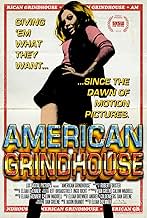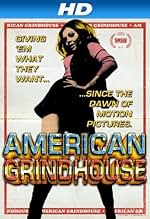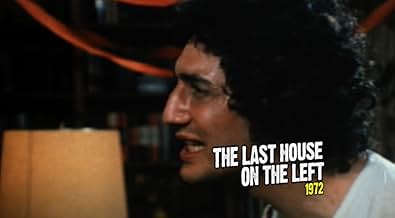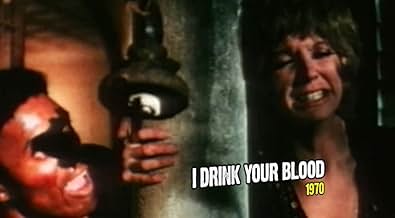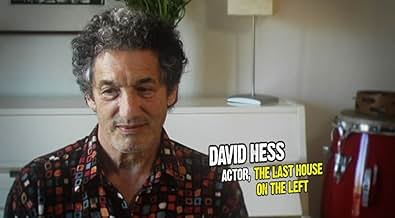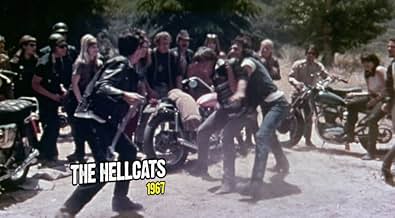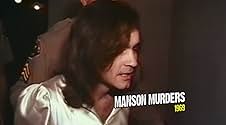VALUTAZIONE IMDb
7,1/10
2718
LA TUA VALUTAZIONE
Aggiungi una trama nella tua linguaA documentary about the history of exploitation movies, from the silent-film era to the 1970s.A documentary about the history of exploitation movies, from the silent-film era to the 1970s.A documentary about the history of exploitation movies, from the silent-film era to the 1970s.
- Regia
- Sceneggiatura
- Star
Recensioni in evidenza
This is a terrific documentary for fans of exploitation cinema and B movies. The documentary charts the history of US exploitation films from the beginnings of cinema to the modern day.
It was Tarantino and Rodriguez that revitalised the term Grindhouse when they made their double feature but it took off in the 1960s with the change of mores and loosening of censorship laws.
It allowed filmmakers to exploit and challenge an area of cinema that was designed for discerning adults that like terror, sex, violence and buckets of blood.
The documentary is narrated by Robert Forster and interviews starts, directors and fans of the genre including Joe Dante, John Landis, Fred Williamson, Larry Cohen, William Lustig, Lewis Teague and others.
However it is not just talking heads, you have clips from grindhouse films and especially a good representation of clips from films of the 1960s and 70s.
It was Tarantino and Rodriguez that revitalised the term Grindhouse when they made their double feature but it took off in the 1960s with the change of mores and loosening of censorship laws.
It allowed filmmakers to exploit and challenge an area of cinema that was designed for discerning adults that like terror, sex, violence and buckets of blood.
The documentary is narrated by Robert Forster and interviews starts, directors and fans of the genre including Joe Dante, John Landis, Fred Williamson, Larry Cohen, William Lustig, Lewis Teague and others.
However it is not just talking heads, you have clips from grindhouse films and especially a good representation of clips from films of the 1960s and 70s.
American Grindhouse (2010)
*** (out of 4)
This film begins with people debating on what a grindhouse film really is and after the release of the film GRINDHOUSE it seems like everyone was debating the true definition. This documentary, to me, covers pretty much everything that wasn't accepted by the mainstream. We cover a wide range of films starting with some early silents from Edison and then moving to Hollywood movies like FREAKS as well as trashier things like MANIAC, REEFER MADNESS and then going through other decades. Included are the "birth" films from the 40s, the nudist films of the 60s, the gore period starting with Herschell Gordon Lewis and then moving through the 70s with stuff like THE LAST HOUSE ON THE LEFT and the blaxploitation pictures. John Landis, William Lustig, Ted V. Mikels, Herschell Gordon Lewis, Joe Dante, Kim Morgan, Fred Olen Ray, Fred Williamson, Allison Anders, Larry Cohen, David Hess, Don Edmonds and Jack Hill are just a few of the people interviewed here and they too have a wide range of opinions on the films covered here. For the most part I think this is a terrific introduction to those unfamiliar with the genre but if you have a good idea of these films and their history then it's doubtful you're going to learn much here. I think American GRINDHOUSE would best be used as a training tool for those new movie fans wanting to see about this stuff and be able to see countless clips as well as get some nice recommendations for rentals. I think the documentary does a good job at covering various genres but at just 83-minutes there's really no way it can really dig deep into everything. Europeon films are pretty much overlooked and this is somewhat frustrating especially when certain films are made to appear as if they started a sub-genre when in fact it was usually something overseas. The film also does a nice job at showing how certain production rules in Hollywood is what helped change the exploitation filmmakers and how Hollywood eventually had to drop what they were doing and offer people what they wanted.
*** (out of 4)
This film begins with people debating on what a grindhouse film really is and after the release of the film GRINDHOUSE it seems like everyone was debating the true definition. This documentary, to me, covers pretty much everything that wasn't accepted by the mainstream. We cover a wide range of films starting with some early silents from Edison and then moving to Hollywood movies like FREAKS as well as trashier things like MANIAC, REEFER MADNESS and then going through other decades. Included are the "birth" films from the 40s, the nudist films of the 60s, the gore period starting with Herschell Gordon Lewis and then moving through the 70s with stuff like THE LAST HOUSE ON THE LEFT and the blaxploitation pictures. John Landis, William Lustig, Ted V. Mikels, Herschell Gordon Lewis, Joe Dante, Kim Morgan, Fred Olen Ray, Fred Williamson, Allison Anders, Larry Cohen, David Hess, Don Edmonds and Jack Hill are just a few of the people interviewed here and they too have a wide range of opinions on the films covered here. For the most part I think this is a terrific introduction to those unfamiliar with the genre but if you have a good idea of these films and their history then it's doubtful you're going to learn much here. I think American GRINDHOUSE would best be used as a training tool for those new movie fans wanting to see about this stuff and be able to see countless clips as well as get some nice recommendations for rentals. I think the documentary does a good job at covering various genres but at just 83-minutes there's really no way it can really dig deep into everything. Europeon films are pretty much overlooked and this is somewhat frustrating especially when certain films are made to appear as if they started a sub-genre when in fact it was usually something overseas. The film also does a nice job at showing how certain production rules in Hollywood is what helped change the exploitation filmmakers and how Hollywood eventually had to drop what they were doing and offer people what they wanted.
'AMERICAN GRINDHOUSE': Four Stars (Out of Five)
A documentary on the history of exploitation films, which are as old as film itself. As the movie points out as soon as man had the power to keep a video recording of things the first thing we naturally wanted to do was record something exploitative. The film is directed by Elijah Drenner (in his feature film debut) and written by Drenner and Calum Waddell. It features interviews with such legendary exploitation filmmakers as John Landis, Joe Dante, Herschell Gordon Lewis, Jack Hill, Larry Cohen, Don Edmonds and many more. The film is narrated by Robert Forster.
The movie follows the history of exploitation film from the turn of the century, when film was invented, to present day and displays a decade by decade examination of it. It intercuts clips from various movies with interviews from different filmmakers, critics and actors discussing them. Some of the earlier clips are the most interesting and shocking. It examines the effects of various things on the industry, like the Motion Picture Production Code as well as the 'Grindhouse' theaters themselves. 'Grindhouse' theaters were movie theaters that almost solely showed exploitation films and usually stayed open all day and night. They were named after the run down burlesque theaters on 42nd Street in New York City. The film follows the history of 'Grindhouse' theaters and the exploitation film industry all the way to it's near extinction in the mid 70's when movies like Steven Spielberg's 'JAWS' finally blurred the lines between indie exploitation and Hollywood films and made exploitation 'B' movies a mainstream excepted thing.
The movie is extremely interesting and educational. It's also very entertaining and never dull. It moves at a remarkably fast pace and finishes in a very quick 80 minute running time. There are a few movies and filmmakers I'm surprised they never touched on, especially considering some of the ones they did, which makes me feel the film is not as complete a film history lesson as it could have been (but then again no movie possibly could be). It is only 80 minutes like I said and I'm sure there were budget restraints as well (It is a very low budget movie itself). The interviews are outstanding and the clips shown are as shocking and disturbing as any movie I've seen. Which makes you wonder if the documentary itself isn't exploitation filmmaking.
Watch our movie review show 'MOVIE TALK' at: http://www.youtube.com/watch?v=CcXJ6wkPwN0
A documentary on the history of exploitation films, which are as old as film itself. As the movie points out as soon as man had the power to keep a video recording of things the first thing we naturally wanted to do was record something exploitative. The film is directed by Elijah Drenner (in his feature film debut) and written by Drenner and Calum Waddell. It features interviews with such legendary exploitation filmmakers as John Landis, Joe Dante, Herschell Gordon Lewis, Jack Hill, Larry Cohen, Don Edmonds and many more. The film is narrated by Robert Forster.
The movie follows the history of exploitation film from the turn of the century, when film was invented, to present day and displays a decade by decade examination of it. It intercuts clips from various movies with interviews from different filmmakers, critics and actors discussing them. Some of the earlier clips are the most interesting and shocking. It examines the effects of various things on the industry, like the Motion Picture Production Code as well as the 'Grindhouse' theaters themselves. 'Grindhouse' theaters were movie theaters that almost solely showed exploitation films and usually stayed open all day and night. They were named after the run down burlesque theaters on 42nd Street in New York City. The film follows the history of 'Grindhouse' theaters and the exploitation film industry all the way to it's near extinction in the mid 70's when movies like Steven Spielberg's 'JAWS' finally blurred the lines between indie exploitation and Hollywood films and made exploitation 'B' movies a mainstream excepted thing.
The movie is extremely interesting and educational. It's also very entertaining and never dull. It moves at a remarkably fast pace and finishes in a very quick 80 minute running time. There are a few movies and filmmakers I'm surprised they never touched on, especially considering some of the ones they did, which makes me feel the film is not as complete a film history lesson as it could have been (but then again no movie possibly could be). It is only 80 minutes like I said and I'm sure there were budget restraints as well (It is a very low budget movie itself). The interviews are outstanding and the clips shown are as shocking and disturbing as any movie I've seen. Which makes you wonder if the documentary itself isn't exploitation filmmaking.
Watch our movie review show 'MOVIE TALK' at: http://www.youtube.com/watch?v=CcXJ6wkPwN0
Just saw "American Grindhouse" at The Boston Underground Film Festival and loved it. Very insightful, very fast and very funny. I enjoyed that they have a couple of witty female interviewees, as well. I thought I knew a lot of movies - particularly grindhouse a.k.a. exploitation films, but this movie puts it all into perspective for me.
I thought that this documentary would mainly focus on the exploitation most of us think of from the 60's on to present day. I am glad to say that is has a much more interesting approach then just that obvious plot. It starts at the turn of the 18th century at the dawn of cinema, all and while amusing classic clips. It progresses decade by decade comparing more contemporary films to pre code Hollywood. These are things most exploitation fans would never really think of...'Where did the 70s exploit films come from, and what inspired them?' I personally welcome this lesson, and don't worry you get the schlock and gore too! My point? Even if your a 'know it all' go see it, it's academic with a punch line. Now if I can only find all of these amazing movies they talked about.
I thought that this documentary would mainly focus on the exploitation most of us think of from the 60's on to present day. I am glad to say that is has a much more interesting approach then just that obvious plot. It starts at the turn of the 18th century at the dawn of cinema, all and while amusing classic clips. It progresses decade by decade comparing more contemporary films to pre code Hollywood. These are things most exploitation fans would never really think of...'Where did the 70s exploit films come from, and what inspired them?' I personally welcome this lesson, and don't worry you get the schlock and gore too! My point? Even if your a 'know it all' go see it, it's academic with a punch line. Now if I can only find all of these amazing movies they talked about.
I really, really enjoyed this. At the same time, though entertaining and informative, it leaves one yearning for so much more. The clips from the films shown are usually VERY short, and quite often, they are not directly discussed by the commentators. Instead, they are used to "illustrate" a more general discussion of one of the sub-genres covered her (ie: pre-code; nudist camp, nudie cuties, etc). I look forward to someone expanding upon this introduction to provide us with a film exploring each of the sub-genres in more depth.
Finally, I was pleased to hear John Landis refer to PASSION OF THE Christ as an Exploitation film, as that's exactly how I viewed it... with total delight, I must say. In fact, given it and APOCALYPTO, an argument could be made for Mel Gibson as the greatest Exploitation film director of the past decade... even if he does not exactly see his own films in that light.
Finally, I was pleased to hear John Landis refer to PASSION OF THE Christ as an Exploitation film, as that's exactly how I viewed it... with total delight, I must say. In fact, given it and APOCALYPTO, an argument could be made for Mel Gibson as the greatest Exploitation film director of the past decade... even if he does not exactly see his own films in that light.
Lo sapevi?
- QuizJohn Amero, Pam Grier, and Harry H. Novak were all approached to be interviewed in this documentary, but they all declined.
- ConnessioniFeatures Corbett and Courtney Before the Kinetograph (1894)
- Colonne sonoreThe Thieving Magpie Overture
composed by Gioachino Rossini
I più visti
Accedi per valutare e creare un elenco di titoli salvati per ottenere consigli personalizzati
- How long is American Grindhouse?Powered by Alexa
Dettagli
Botteghino
- Lordo Stati Uniti e Canada
- 5529 USD
- Lordo in tutto il mondo
- 5529 USD
Contribuisci a questa pagina
Suggerisci una modifica o aggiungi i contenuti mancanti

Divario superiore
By what name was American Grindhouse (2010) officially released in India in English?
Rispondi

